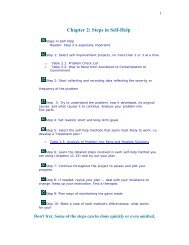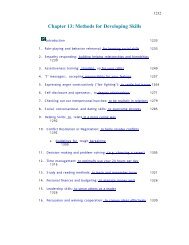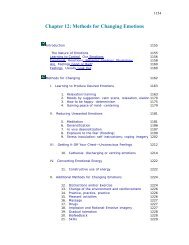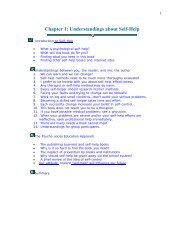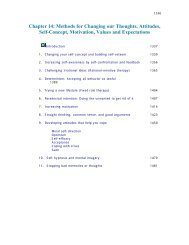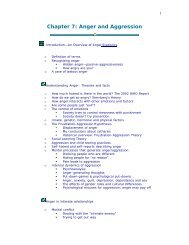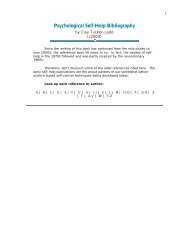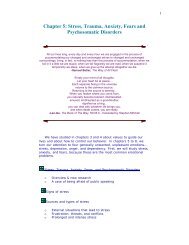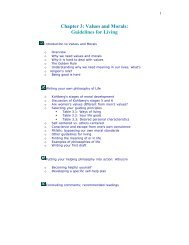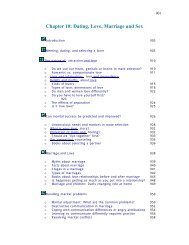Methods for Changing Behaviors - Psychological Self-Help
Methods for Changing Behaviors - Psychological Self-Help
Methods for Changing Behaviors - Psychological Self-Help
Create successful ePaper yourself
Turn your PDF publications into a flip-book with our unique Google optimized e-Paper software.
have to offer to encourage the desired behaviors (in others or<br />
oneself)?"<br />
Let's consider some examples from each viewpoint: (1) the<br />
motivated learner knows the rewards he/she wants but not how to get<br />
them. The Little Leaguer wants to hit the ball hard but it takes a lot of<br />
practice to learn how. Each successful hit is a reward, i.e. a source of<br />
satisfaction and motivation to keep trying, and a source of in<strong>for</strong>mation<br />
about what to do to be successful in the future. The young man<br />
starting to date must learn (often by "exploration," of course I mean<br />
trial and error) how to behave to get the rewards he wants from his<br />
girlfriend. Much of life is discovering what works <strong>for</strong> you to get what<br />
you want (see method #2). Once we "know what to do," i.e. we have<br />
learned the lawful relationships between behavior and payoffs. Then<br />
we use this knowledge over and over, whenever we want the payoff,<br />
and the behavior may become a habit.<br />
(2) Sometimes we have learned behaviors and/or sought goals<br />
that are not ideal; they are bad habits. We become dissatisfied and<br />
want to change. In this case, operant learning principles simply say:<br />
reward the desired behavior (or behavior approximating the desired<br />
behavior) and don't reward the unwanted habit.<br />
There are innumerable illustrations of the power of rewards in<br />
psychology--children's behavior change, students' study habits<br />
change, patients' symptoms change, self-concepts change, topics of<br />
conversation change... when the rewards are changed. This is positive<br />
rein<strong>for</strong>cement. B. F. Skinner believes it is one of the most powerful<br />
and useful ideas in psychology. It provides a solution of many human<br />
troubles.<br />
Good and evil, reward and punishment, are the only motives to a rational creature: these<br />
are the spur and reins whereby all mankind are set on work, and guided.<br />
-John Locke, 1690<br />
The major problem with positive rein<strong>for</strong>cement is that our Creator<br />
<strong>for</strong>got to make it automatic to give rewards, praise, and love when<br />
things are going well. Note that the Creator remembered to build in<br />
automatic irritation when things don't go our way. Strange isn't it?<br />
Fortunately, the Creator seems to have realized the mistake be<strong>for</strong>e<br />
humans were finished and stuck a glob of 150 billion nerve cells on<br />
top. We call it our brain. To effectively use positive rein<strong>for</strong>cement, we<br />
have to think! And, what's worse, we have to think to do something<br />
when we are pleased and satisfied and feeling good. Or, just as<br />
difficult, think in advance of rewards to give later when good behavior<br />
1123



